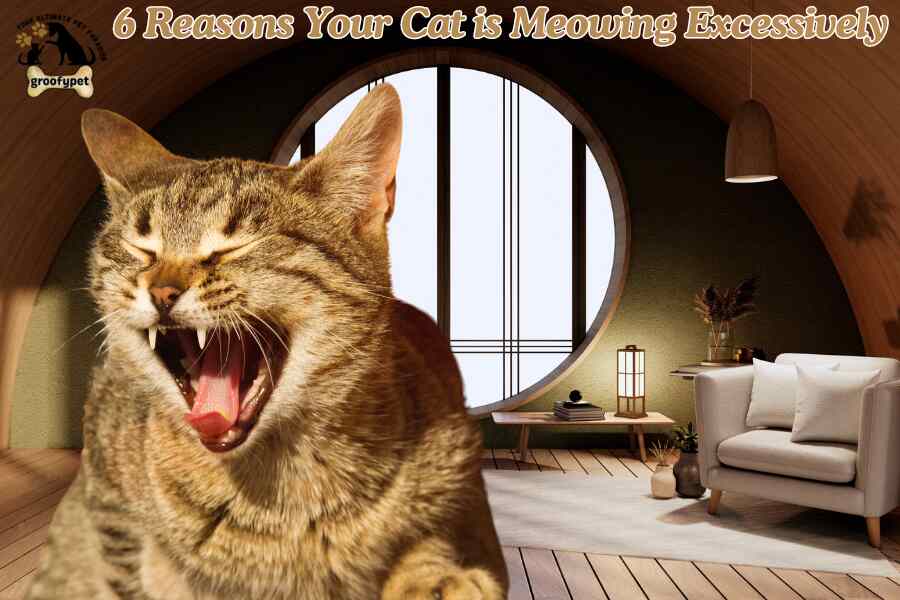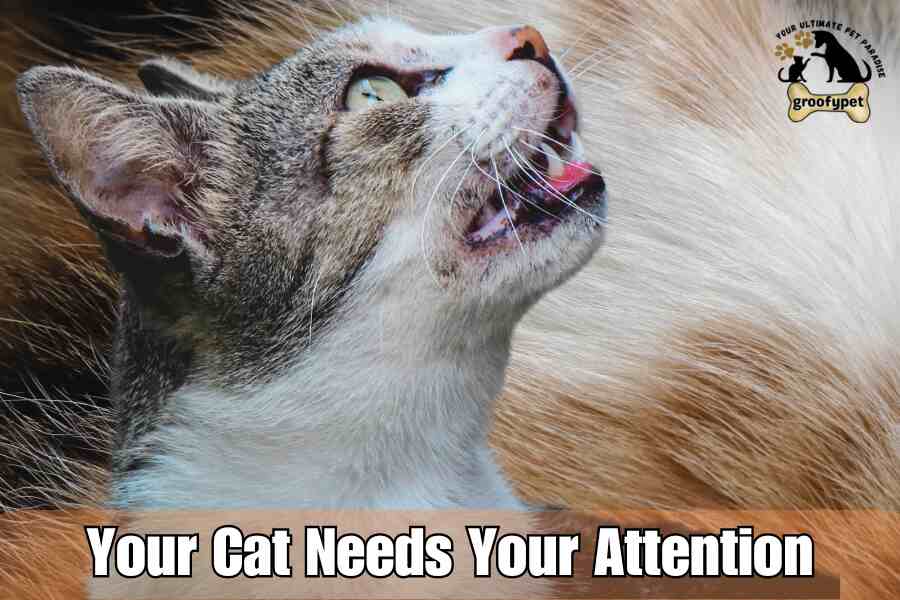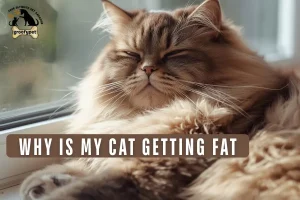
6 Reasons Your Cat is Meowing Excessively. But Why? Cats are wonderful companions, but sometimes their meowing can be a bit too much. Cats use vocalizations like meowing, yowling and purring to communicate. Excessive meowing can indicate that something is wrong or that your cat has specific needs. It’s important to understand these signs to ensure your feline friend is healthy and happy.
Are you frustrated with your cat’s non-stop meowing? This behavior can be challenging and disrupt the peace at home. Your cat might be hungry, seeking attention, or feeling scared. Identifying the cause can help you address the issue effectively. Ensuring your cat has food and water, a stable environment, and regular health check-ups can significantly reduce excessive meowing.
Cats meow to communicate needs or discomfort. Ensure they have food, water, and a stable environment to reduce excessive meowing. If it persists, consult a vet to rule out health issues.
Different breeds of cats have different vocalization habits. For example, Oriental and Siamese cats are known to be more vocal. It’s important to recognize that some cats are naturally more talkative. If your cat’s meowing seems excessive, consider consulting a veterinarian.
They can rule out any health issues and provide guidance. Understanding your cat’s behavior will help you create a peaceful and loving home for both you and your feline friend.
Want to learn more about why your cat is meowing too much? Discover effective strategies to address your cat’s needs and ensure their well-being.
Table of Contents
Toggle6 Reasons Your Cat is Meowing Excessively and make sound different
If your cat’s meow changes, it could indicate an upper respiratory infection, laryngitis, laryngeal paralysis, or tumors. Look for symptoms like runny eyes, nose, sneezing, and appetite loss. Consult a vet to identify the cause.
6 Reasons Your Cat is Meowing Excessively. You need to consider
Excessive meowing in cats can signal that something needs attention. It might be their way of asking for food, attention, or help. Understanding the reasons behind the noise can help keep your cat happy and healthy.
Your Cat Needs Your Attention
Sometimes people think that a cat is aloof and prefers being alone, like a loner. However, the majority of cats actually crave attention and love interacting with their owners. If your cat is incessantly meowing, it might be because they feel bored or lonely.
A good remedy is talking to them, giving a gentle scratch behind the ears, or having a play session with their favorite toy. This attention can help satisfy their need for social interaction. As a cat owner, I’ve noticed that engaging with my cat daily keeps her from feeling neglected and ensures she stays happy and content.

Your Cat Needs Something
Cats, like other animals, use their voice to communicate with people when they need something. One common reason is that they are hungry or their food or water bowl is empty. When my cat starts to meow a lot, I always check to see if she has enough food and water.
Sometimes, she wants access to a different room or wants to go inside or outside. Other times, she just wants me to change the channel on the television. By learning to listen to your cat’s specific meows, you can better understand what they need and provide the right remedy.
Your Cat Wants to Mate
When a female cat is in heat, she becomes very vocal and will often yowl for about a week each month. This is because she has a natural desire to breed. Similarly, a male cat can smell a female in heat and will yowl more to try and find her. To prevent this type of excessive yowling, spaying or neutering your cat can provide significant relief.
Your Cat Feels Stressed
A change in your home, like a new baby, an illness, a loss, or a move, can make your cat more vocal, stressed and hissing. I’ve noticed that during a trip to the vet, my cat becomes very vocal. To calm your cat, focus on alleviating stressors by providing extra attention and stability. This can help soothe their nerves and reduce excessive meowing.
Your Cat is Getting Older
As a senior cat, your pet might start to yowl more at night, waking up the entire house. This is often a sign of old age, similar to how elderly humans experience cognitive and mental dysfunction, such as vision or hearing loss and forgetfulness.
These issues can leave your cat cats excessive vocalization confused, dazed, and disoriented. It’s common for them to frequently meow during the night.
Many owners find that using night lights helps to put their cats at ease. Keeping the environment stable and stationary can also help your cat navigate their surroundings better, thus decreasing their confusion.
Your Cat Might Be Sick
If your cat’s meowing has changed suddenly, it could be a sign that something is medically wrong. This new behavior might indicate they are hungry, thirsty, or in pain. Various diseases, like kidney disease or overactive thyroids, can cause increased vocalization and distress.
It’s important for pet grooming to get a checkup with a veterinarian to rule out any serious conditions. Regular visits to the veterinarian can help catch these symptoms early and ensure your cat stays well.
What should I not do?
- Cats can be vocal for many reasons, from a litter box issue to needing their water bowl refilled.
- Check if they are trapped in a room or have any immediate needs.
- Sometimes, simply meeting their needs can reduce meowing.
- Avoid actions that can make the situation worse:
- Punishing
- Hitting
- Shouting
- Spraying your cat
- These actions can lead to distrust and dislike, which, in the long run, can worsen the behavior.
- Ignoring the meowing might seem like a good idea, but if your cat is meowing for a reason, this could cause them to get louder.
- Instead, try to determine the reason behind the meowing and correct the problem safely.
- If they meow because they want attention, wait until they are quiet before rewarding them.
- Rewarding quiet behavior and ignoring the excessive meowing will eventually teach your cat that being quiet gets them what they want.
- Remember, if a strategy isn’t working, it’s time to try something else before the behavior gets worse.
What Does My Cat Mean When They Speak?
The unmistakable sound of your cat’s meow can signify various reasons. Cats have many different types of meows, each with a unique meaning. By listening to the various kinds of meows, you can see what your cat’s cry means, whether they are hungry, seeking attention, or something else.
This chart of meows helps decode what your cat’s meows mean.
| Type of Meow | What Does It Mean |
| Short Meow | Greeting |
| Multiple Meows | Excitement |
| Mid-Pitch Meow | Asking for something (food, attention) |
| Long Meow | Persistent demand |
| Low-Pitch Meow | Complaint or displeasure |
| High-Pitch Meow | Pain or distress |
| Chirping | Attention to something outside (like birds) |
| Purring with Meow | Seeking comfort or affection |
| Trilling | Friendly greeting, often used by mother cats to call kittens |
What should you do when your cat meows excessively and doesn’t stop?
Dealing with a cat that won’t stop meowing can be challenging. Here are some solutions to handle this situation when your cat is overly vocal. The best way is to show tough love by not always giving in to their demands. Do follow the right ways, such as ensuring they are not hungry, lonely, or in pain.
Playing with your cat regularly can also help reduce excessive meowing. However, remember that sometimes the situation requires patience and understanding. Each cat is different, so finding the right balance in handling their vocal behavior is key.
Ignoring Nighttime Cries
Have you ever been woken up in the middle of the night by your cat crying for food or treats? If it’s not the designated time to eat, the best strategy is to ignore these pleas until feeding time. The reason behind this is straightforward: putting your cat’s health first is essential. Overfeeding can easily lead to your cat becoming obese.
By sticking to a routine and feeding only at the designated meal or treat times, you ensure they stay healthy and maintain a proper weight. I remember my own struggle with my cat persistent meowing, and it took a lot of patience to wait until she was quiet before offering her meals, but the results were worth it. Not only did she adjust to the routine, but it also helped prevent her from becoming overfed.
Play Before Bedtime
If your cat is crying at night, it might be because they need more activity during the day. To prevent your cat from meowing loudly outside your bedroom at night, try engaging them in playtime before bedtime. . From personal experience, making sure my cat had enough play before bed significantly reduced her nighttime cries
Is Their Litter Box Clean?
When your cat is crying near the litter box, it’s likely because they detest a dirty bathroom. Cats prefer a pristine environment, and if their litter box isn’t clean, they take offense. Make sure to clean the litter box daily to keep them happy and reduce excessive meowing.
I found that keeping my cat’s litter box spotless really helped in minimizing her cries. By ensuring the litter box is always clean, you can provide a comfortable space for your cat and a quieter home for yourself.
The Meows Signal Serious Issues
When your cat cries with a low-pitched and painful sound, it can be concerning. These cries might indicate that your cat is in pain and needs to see a vet as soon as possible. It’s important to not ignore these signs and to stop and listen to what your cat is trying to communicate.
From my experience, taking these meows seriously helped me identify health issues early and get my cat the care she needed.
My cat is meowing a lot more than usual
sounds like your cat’s increased meowing could be trying to communicate something important. Cats often change their vocalization patterns when they’re experiencing discomfort, hunger, stress, or seeking attention – with some cats becoming more vocal as they age or during breeding seasons.
While occasional changes in meowing can be normal, persistent or sudden increases might warrant closer observation of other behavioral changes, like differences in eating, drinking, or litter box habits, which could help determine if this is just a phase or possibly a sign of an underlying health issue that might benefit from a veterinary check-up.
When to Take Your Cat to the Vet for Excessive Meowing?
- If your cat is meowing excessively, it might be time to think about a veterinary appointment.
- Watch for signs like your male kitty straining to urinate, as this can be serious.
- If you notice open-mouth panting, it’s an emergency. Weight loss, changes in appetite or attitude, and distress are also red flags.
- Your cat might be in pain if it shows changes in urination.
- Call the vet immediately if you observe these symptoms.
- It’s important to follow your instinct because something might be wrong.
- The soonest opportunity to get your cat examined can prevent further issues. Panting, weight loss, pain, and other sudden changes could signal the need to seek veterinary care and find the cause.
- Don’t hesitate to call the vet at the soonest opportunity.
Frequently Asked Questions
Why Is My Cat Meowing All the Time?
Cats meowing excessively could mean they’re hungry, afraid, sick, or seeking attention and love. These sounds may be non-stop and can be challenging to figure out. Pay attention to the times your cat meows to identify the issue and make them feel better.
How to stop excessive cat meowing?
Creating a behavior modification plan with a strong backbone is crucial. Talk to your cat and understand their needs. If they meow in the middle of the night, avoid rewarding this behavior with attention or food. Instead, ignore unnecessary meowing and provide ample play during the day. Consistency in addressing this habit is key to success.
Why Does My Cat Roam the House Meowing?
If your cat is walking around and meowing, it might be perfectly harmless or a chance for them to make their needs known. Your kitty might be hungry, bored, or experiencing a change in their routine, which can make even a previously quiet cat start mewing suddenly. This behavior shouldn’t be ignored, as it can indicate many things, from seeking attention to signaling a health issue.
Conclusion
As a cat parent, it can be puzzling when your cat is meowing excessively, but there are several reasons for this unusual behavior. Cats often meow to talk to their owners, and they may have different things to tell you. It’s crucial to listen to your cat to understand what they are trying to speak.
One reason for constant meowing is seeking attention as they may want to play or cuddle. Another possibility is that your cat is not feeling well, as an excessive meow could indicate discomfort or pain.
Sometimes, a cat’s meowing might express their needs, such as hunger, thirst, or a dirty litter box. While it’s normal for cats to meow more as they age or if in heat, constant meowing might mean a trip to the vet is necessary.
Being a good cat parent means understanding that while some meowing is normal, unusual and excessive vocalization can be a sign that your cat needs something or is trying to communicate an issue.



